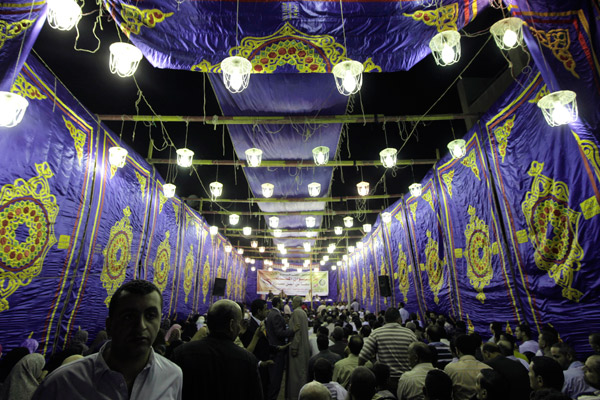
Supporters attend a Muslim Brotherhood electoral rally in the Munib neighborhood of Cairo, Egypt. (Photo: Nasser Nasser / AP)
Essam Erian throws his hands up in mock surrender. “I cannot answer this question,” he says, smiling broadly. “This is a question for me to ask, for you to answer.”
The question: What does the Muslim Brotherhood have to do to stop being portrayed as the bogeyman? The Egyptian Islamist movement has been trying very hard to shake the label. Since the fall of President Hosni Mubarak, the Brotherhood has leaned over backward to convince the world that it is not a radical force seeking to drag Egypt into the past, like Afghanistan’s Taliban, or a reactionary group with an appetite for violence, like Hamas.
Erian, one of the Brotherhood’s top leaders, ticks off the conciliatory gestures they’ve made. Early on, the movement said it would not field a candidate for president; when a prominent member said he would run, his membership was promptly and publicly revoked. The group has said it won’t even seek a majority in parliament, and contest only 50 per cent of seats. Erian says the Islamists will go to the polls as part of a coalition that will include parties representing secular, Coptic and Leftist groups. And Brotherhood leaders have said repeatedly that they will not seek a disproportionate voice in any post-election constitutional reform process.
In short, the Brotherhood would like to be seen as no more threatening than Turkey’s ruling AK party: Islamist Lite.
(READ: Why the Muslim Brotherhood Are Egypt’s Best Democrats)
Taken at face value, these are huge concessions. But many Egyptian liberals (and most Western commentators) are not sure they can take the Brotherhood at their word. “They cannot be trusted,” says Alaa Aswany, the novelist and prominent liberal voice. “They will say anything, make any deal to get power. But in the end, they don’t see a difference between the nation’s interests and their own.”
Others, speaking privately, hint darkly about connections between the Brotherhood and Wahhabi groups in Saudi Arabia, but are unable to offer any tangible proof of foreign funding or influence.
Such fears lead liberals to argue that any changes to the country’s constitution should be made before elections, even though Egyptians voted overwhelmingly in a March referendum to leave constitutional reforms in the hands of a freely elected parliament. A “Constitution First” movement, which includes prominent liberals like Mohamed ElBaradei, has started a petition and is seeking 15 million signatures, or about 1 million more than voted “Yes” in the referendum.
The Brotherhood argues, not unreasonably, that attempts to deep-six the referendum bode ill for Egypt’s nascent democracy. “It’s okay to criticize us,” says Erian. “But it’s not a good idea to insult the 14 million who voted for the referendum.”
But not all the criticism of the Brotherhood comes from the outside. The movement’s younger members worry that the leadership is out of touch with the aspirations of ordinary Egyptians. Islam Lotfy, a prominent ‘Young Brother,’ says the elders were too cautious when the revolution broke out, and waited too long to throw their weight behind the youth movement in Tahrir Square. “They were worried about the interests of the Brotherhood, when they should have been worried about the interests of the people,” he says.
That kind of candor can lead to an expulsion from the Brotherhood, but the prospect doesn’t worry Lotfy’s colleague Mohammed Qassas. The old guard “are not happy with us, and may take drastic steps,” he concedes. If it comes to that, the Young Brothers may set up their own party, or throw in their lot with liberal youth groups.
Others wonder whether the movement should even try to reinvent itself as a political party. Ibrahim Houdaiby, a researcher on Islamist movements, believes the Brotherhood has already served its main purpose, which was to preserve the Muslim identity from the brand of modern secularism thrust on Egyptians by Mubarak and his predecessors. “It’s time to declare victory and dismantle,” he says. “You have done your job, preserved your identity. Thank you. Now, go home.”
Houdaiby’s criticism carries a special sting: he is the son of a revered Islamist, and was once seen as a future leader. But he decided three years ago that the Brotherhood “no longer had the answers to the questions” that interested him, and quit.
Erian allows that the Brotherhood needs to redefine itself, but he says that process is already under way. “We’re no longer an opposition group, so we can’t simply be criticizing and opposing all the time,” he says. “Now we have the responsibility of finding solutions to Egypt’s problems.” To ensure this shift in attitude, many Brotherhood members who were members of parliament in the Mubarak years will not stand in the next election: their purpose as the opposition served, they will be replaced by new faces with constructive ideas. A detailed election manifesto is in the works.
Self-examination, external criticism, internal dissent: if these don’t make the Muslim Brotherhood seem less threatening to liberals, what else could?
How about a spanking defeat at then hands of voters? Hisham Kassem, a former journalist and liberal politician, takes some comfort from the fact that the Islamists were trounced in recent students unions elections in three universities. He predicts the Islamists will fare poorly in the parliamentary elections, too. “They have lost the ‘I hate Mubarak’ vote,” he says.
I ask Erian for his assessment of the Brotherhood’s chances, but he’s too good a politician to go there. “That’s for Egyptians to decide,” he says. So we return to the question I asked at the start of the interview: What does the Brotherhood have to do to lose the bogeyman label? But he won’t go there, either. “In the end, people will judge us by what we do,” he says.
There may be a lesson for the Brotherhood to learn: politics is rarely that fair.

